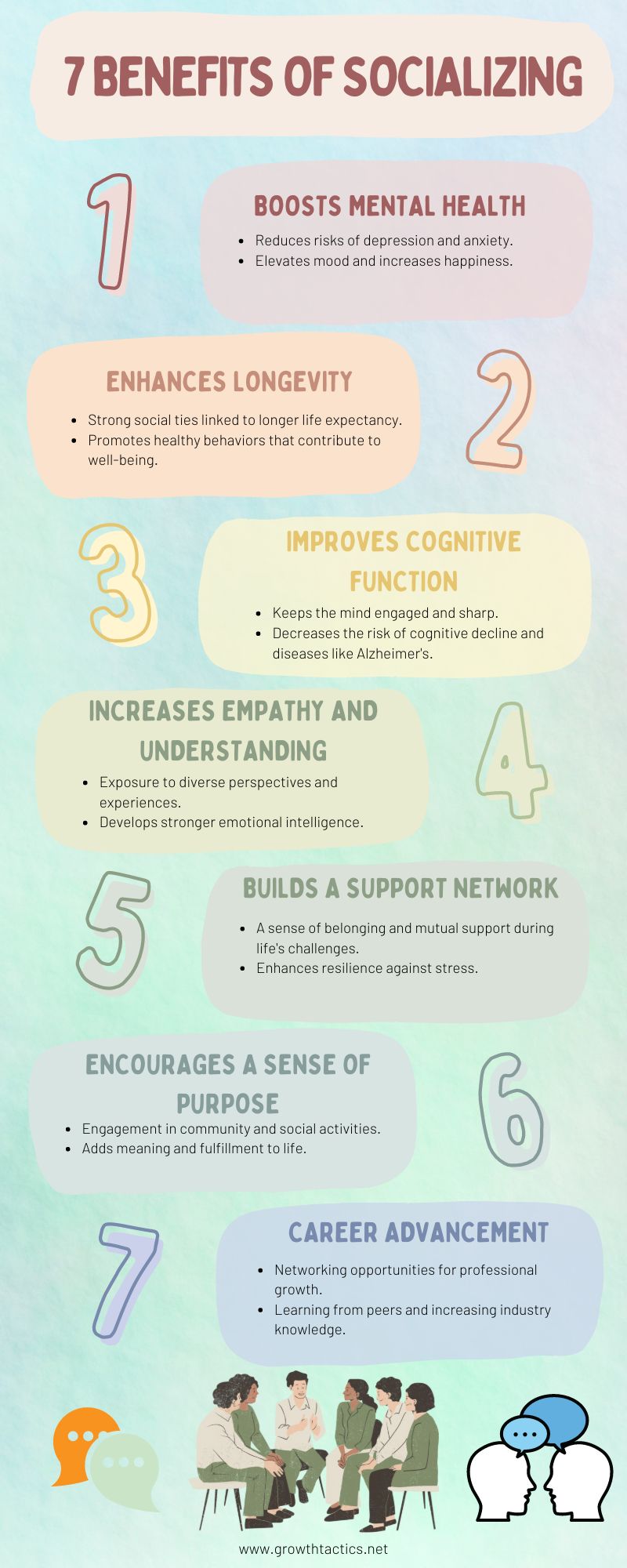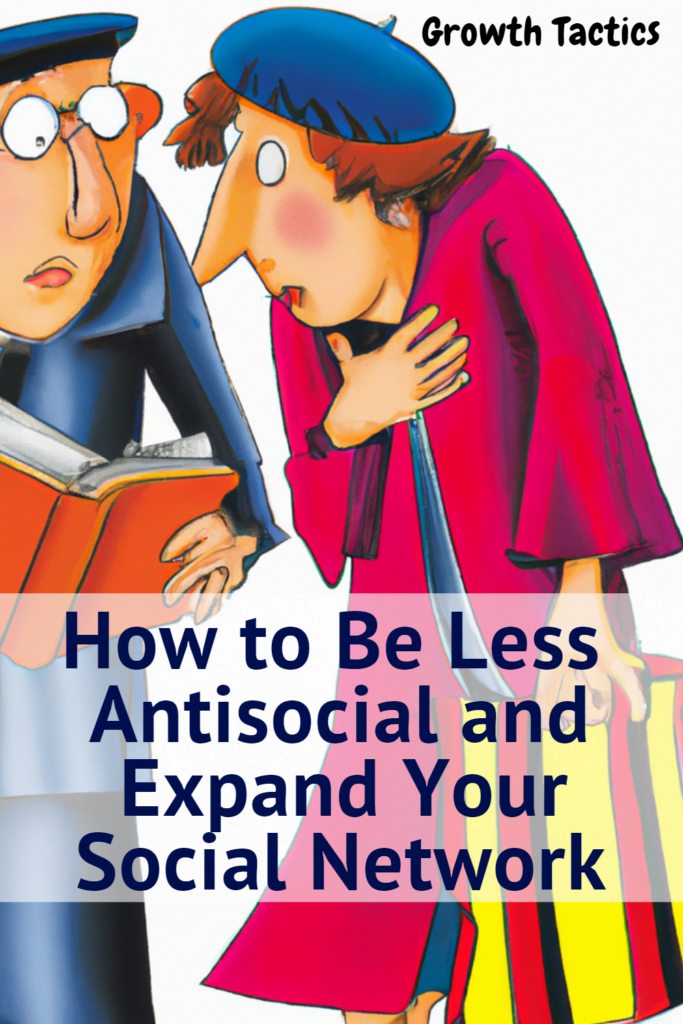Are you feeling left out of the social loop? Do you often avoid parties, dread small talk, or struggle with the idea of meeting new people? It’s time to shake off that cloak of isolation and step into a world buzzing with connections. Socializing isn’t just about chitchat over coffee; it’s a doorway to opportunities, friendships, and better mental health.
This article is your first stride towards a more engaged and vibrant social life. Let’s leave those antisocial tendencies behind and start weaving a network of relationships that energize and inspire you. Ready to transform how you interact with the world? Keep reading.
Jump To Section
Understanding Antisocial Traits and Symptoms
To change, first understand what you’re dealing with. Antisocial does not just mean you’re shy or prefer your own company. It’s more complex. Here’s what you need to know:
- Antisocial Behavior vs. Personality: Not all antisocial signs point to an antisocial personality disorder. Sometimes, it’s about behavior that can change.
- Impact on Life: These traits can make socializing hard. You might avoid friends or feel uneasy and worry in groups.
- Spotting the Signs: Look for clues in your behavior. Dodging social events? Always picking faults in social settings? These are signs.
- Not Just You: Many people feel this way. Knowing you’re not alone can be a comfort.
Traits to Watch For:
- Avoiding social situations on purpose
- Feeling angry or bitter about socializing
- Struggling to trust others
- Preferring to be alone most of the time
- Feeling little guilt or regret after upsetting someone
Why It Matters:
Understanding these traits helps in tackling them. It’s the first step to enjoying social moments instead of fearing them. If you see these traits in yourself, there’s a way out. And it starts with accepting that change is possible.

Strategies to Reduce Antisocial Behavior
Tackling antisocial behavior starts with a plan. Here are key strategies to consider:
1. Start Small
Begin with manageable interactions. Chatting with a neighbor or conversing with someone at a coffee shop can serve as excellent starter points.
These small engagements allow you to gradually increase your comfort level with larger social settings, paving the way for more significant interactions without feeling overwhelmed. It’s about taking those baby steps that lead to more considerable progress over time.
2. Set Realistic Goals
Aim for achievable social objectives. Whether it’s joining a new hobby group, attending social events, or simply spending quality time with friends every week, setting clear, measurable goals helps track progress.
Celebrate every milestone you reach, no matter how small, as each accomplishment boosts your confidence and motivates you to continue.
3. Practice Empathy
Empathy is about understanding and sharing the feelings of others. It involves actively listening to people, asking about their experiences, and imagining yourself in their position.
This approach reduces negative judgments and opens the door to more meaningful connections. Empathy fosters a deeper understanding and acceptance, which are crucial for building lasting relationships.
4. Improve Communication Skills
Effective communication is the foundation of any healthy social interaction. Work on articulating your thoughts clearly and concisely.
Participating in clubs, workshops, or classes can offer a platform to practice and enhance both your speaking and listening skills in a supportive environment. The ability to communicate effectively greatly improves your interactions with others.
5. Seek Feedback
Constructive feedback is invaluable for personal growth. Ask friends, family members, or even colleagues for their honest opinions on areas you could improve socially.
Be receptive to their suggestions and willing to make changes. Actively seeking and implementing feedback demonstrates a commitment to personal development and leads to more rewarding social interactions.
6. Manage Stress
Social scenarios can sometimes be stressful, especially for those prone to social anxiety. Identifying and practicing stress-reducing techniques such as exercise, meditation, or engaging in hobbies can help mitigate these feelings.
Managing stress effectively not only makes social interactions less intimidating but also improves your overall well-being making you feel more confident in social situations.
7. Build on Existing Relationships
Focus on deepening the bonds with family and close friends. Nurturing these existing relationships can be incredibly fulfilling.
Dedicated time and effort into strengthening these connections often result in a richer, more satisfying social life. These relationships provide a solid foundation on which you can build new social experiences.
8. Limit Social Media
While social media keeps us connected, excessive use can lead to feelings of isolation and loneliness. Be mindful of your screen time and actively choose to engage in real-life interactions over virtual ones whenever possible. Fostering face-to-face connections enhances your emotional well-being and develops your social skills.
9. Develop New Hobbies
Pursuing new interests not only enriches your life but also connects you with others who share your passions. Whether it’s sports, arts, crafts, or any other activity, joining clubs or groups related to your hobby provides natural opportunities to meet new people and forge friendships based on common interests.
10. Volunteer
Giving back to your community can be a powerful way to connect with others and feel part of something larger than yourself. Volunteering brings you into contact with diverse individuals and can significantly boost your self-esteem. It also offers the satisfaction of making a positive impact, which can diminish antisocial feelings.
11. Be Curious
Cultivate an interest in the lives and stories of people you meet. Asking questions and showing genuine intrigue in their experiences can make social interactions more engaging and rewarding. Curiosity opens up avenues for deeper, more meaningful conversations and connections.
12. Learn to Handle Rejection
Rejection is an inevitable part of social interactions. Learning not to take rejections personally and understanding that they do not reflect on your self-worth is crucial.
Developing resilience in the face of rejection allows you to move on more quickly and keeps you open to new social opportunities.
13. Embrace Positive Thinking
Adopting a positive mindset towards social engagements can have a transformative effect on your experiences. Focus on the positive aspects and outcomes of social interactions to motivate yourself to participate more and enjoy socializing. Positive thinking attracts positive experiences, creating a virtuous cycle of social engagement.
14. Practice Self-Care
Taking care of your physical and mental health is vital for managing social interaction. Eating well, getting enough rest, and regular exercise not only improve your mood and energy levels but also make social engagements more enjoyable and less taxing. Remember, self-care is the foundation upon which successful social relationships are built.
15. Set Boundaries
Recognizing and respecting your social limits is essential. It’s perfectly acceptable to decline invitations or take time for yourself when needed. Setting healthy boundaries prevents burnout and ensures that your social life remains enjoyable and manageable.
16. Reflect on Interactions
After social events, take the time to reflect on what went well and what could be improved. This practice allows you to learn from each experience, continuously refine your social skills, and enhance your future interactions. Reflection is a key component of growth in any area of life, including socialization.
Incorporating these strategies into your life requires patience and effort. Stay committed, and gradually, you’ll find antisocial behaviors giving way to a more engaged and fulfilling social life.
Overcoming Common Challenges
When working to reduce antisocial behavior, you’ll face obstacles. Here’s how to tackle some common challenges:
Fear of Judgment
People often fear others will judge them. Confront this fear head-on. Remember, everyone makes mistakes. Most people are too focused on themselves to judge you.
Difficulty Trusting Others
Trust takes time. Start with small acts of trust in safe relationships. Gradually, you’ll feel more at ease trusting more people with larger things.
Low Self-Esteem
Boost your self-confidence. Celebrate your strengths. Every small success is a victory. Remember, self-worth is internal, not determined by others.
Feeling Misunderstood
Use clear communication to express your thoughts and feelings. Ask for clarification to avoid misunderstandings. Being understood starts with understanding.
Resistance to Change
Change feels scary. Acknowledge this fear. Take one step at a time. Every small change is progress.
Social Exhaustion
Socializing can be tiring. Allow time for rest. Balance social activity with solitude to recharge. Restore your energy to enjoy your next social interaction.
Handling Conflict
Conflict is a part of life. Approach it as a chance to learn. Listen to the other person’s point of view. Speak calmly. Look for compromise.
Balancing Social Life with Personal Time
Find the right mix of social time and alone time. It’s okay to prioritize your needs. Balance leads to a healthier social life.
Overcoming Past Negative Experiences
Past hurts can hinder you. Let yourself heal. Focus on creating new, positive experiences. Bit by bit, leave the past behind.
Maintaining Consistency
Being consistent is tough. Set a routine for social interaction. Stick to it, even when it’s hard. Consistency breeds habit.
Facing these challenges won’t always be easy, but it’s worth the effort. With each challenge you overcome, you’ll grow stronger and more confident in your social abilities.
The Role of Professional Help
Sometimes, a guide makes the journey easier. Professional help matters and here’s why:
Therapy can be transformative. A therapist might spot barriers you ignore. They offer insight and methods to bridge the gap to a healthier social life. This isn’t just about discussing feelings; it’s about active change.
Professional guidance extends beyond conversation. You gain strategies to combat social anxiety and build stronger relationships. Practical exercises and targeted advice help you navigate the complexities of interaction.
For some, medication is a game changer. When therapy alone isn’t enough, prescribed medicine can correct imbalances. This isn’t a universal solution, but for certain individuals, it’s vital.
Recognizing the strength in seeking help is a major step. It’s an act of courage, not defeat. Seeing a mental health professional signifies a commitment to improving your social health.
In the quest to manage antisocial traits, remember that professionals are partners in your progress. It’s perfectly okay to rely on their expertise as you work toward a more sociable you. Seeking help is a sign of self-care and a proactive approach to a more connected life.
Conclusion
Change won’t happen overnight. But with perseverance and the right strategies, reducing antisocial behavior is achievable. Every step forward is progress in building a happier, more social you.


